I'm trying to run a google app script function remotely from a python flask app. This function creates google calendar events with inputs from a google sheet. I referred to this documentation from Google in order to set up the python script to run the appscript function. I followed every step required to deploy the app script project as an executable API and connected it to a google developer project and made OAuth 2.0 ID credentials as well.
From the API executable documentation, I got the following code and modified it to run as an object which can be called from the main server file.
from __future__ import print_function
from googleapiclient import errors
from googleapiclient.discovery import build
from httplib2 import Http
from oauth2client import file as oauth_file, client, tools
class CreateGCalEvent:
def main(self):
"""Runs the sample.
"""
SCRIPT_ID = 'my app script deployment ID was put here'
# Set up the Apps Script API
SCOPES = [
'https://www.googleapis.com/auth/script.scriptapp',
'https://www.googleapis.com/auth/drive.readonly',
'https://www.googleapis.com/auth/drive',
]
store = oauth_file.Storage('token.json')
creds = store.get()
if not creds or creds.invalid:
flow = client.flow_from_clientsecrets('app_script_creds.json', SCOPES)
creds = tools.run_flow(flow, store)
service = build('script', 'v1', credentials=creds)
# Create an execution request object.
request = {"function": "getFoldersUnderRoot"}
try:
# Make the API request.
response = service.scripts().run(body=request,
scriptId=SCRIPT_ID).execute()
if 'error' in response:
# The API executed, but the script returned an error.
# Extract the first (and only) set of error details. The values of
# this object are the script's 'errorMessage' and 'errorType', and
# an list of stack trace elements.
error = response['error']['details'][0]
print("Script error message: {0}".format(error['errorMessage']))
if 'scriptStackTraceElements' in error:
# There may not be a stacktrace if the script didn't start
# executing.
print("Script error stacktrace:")
for trace in error['scriptStackTraceElements']:
print("\t{0}: {1}".format(trace['function'],
trace['lineNumber']))
else:
# The structure of the result depends upon what the Apps Script
# function returns. Here, the function returns an Apps Script Object
# with String keys and values, and so the result is treated as a
# Python dictionary (folderSet).
folderSet = response['response'].get('result', {})
if not folderSet:
print('No folders returned!')
else:
print('Folders under your root folder:')
for (folderId, folder) in folderSet.items():
print("\t{0} ({1})".format(folder, folderId))
except errors.HttpError as e:
# The API encountered a problem before the script started executing.
print(e.content)
Here is where the error comes. It can neither locate token.json nor the app_script_creds.json.
Now with a service account and any normal OAuth2.0 ID, when I create it, I will be given the option to download the credentials.json but here,  this is all I seem to be getting, an App Script ID with no edit access or credentials to download as JSON. I created another OAuth ID in the same project as shown in the screenshot which has the edit access and json ready for download. When I used that json file inside the python script, It told me that it was expecting redirect uris, which I don't know for what it is or where to redirect to.
this is all I seem to be getting, an App Script ID with no edit access or credentials to download as JSON. I created another OAuth ID in the same project as shown in the screenshot which has the edit access and json ready for download. When I used that json file inside the python script, It told me that it was expecting redirect uris, which I don't know for what it is or where to redirect to.
What do I need to do to get this working?